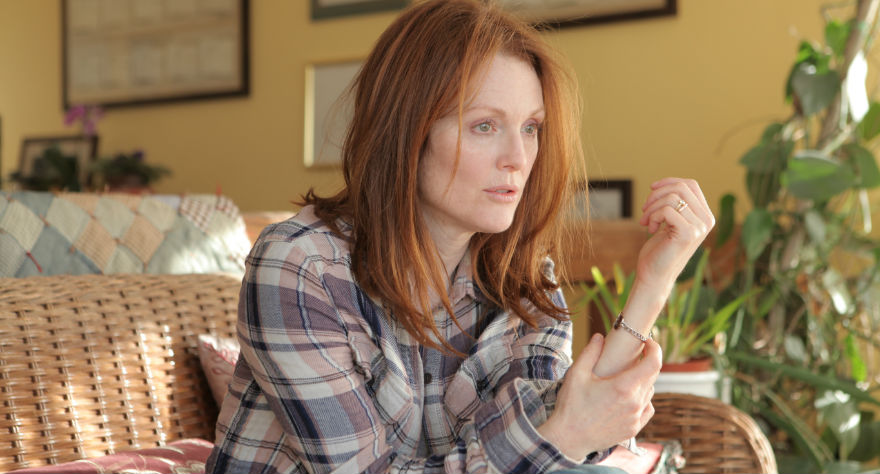
Moore gives her all as an Alzheimer's sufferer in a dumpy, schematic disease movie.

Moore gives her all as an Alzheimer's sufferer in a dumpy, schematic disease movie.
Like a soaring guitar solo in a mediocre song, Julianne Moore will blow you away in Still Alice, while the rest of the rickety disease movie can barely hold itself together. The movie isn’t a disaster, though; you can’t really divorce Moore’s performance from the rest of the film because the performance intrinsically belongs to the film. But is Moore alone enough to make Still Alice worth watching? The short answer is no, but she does get some help from a young, underrated actress whose effort is just as commendable, but will likely go unnoticed by most. More on that later…
Movies about pressing, important topics like, in this case, Alzheimer’s disease, are fueled by good intentions, though it almost goes without saying that golden statues are always part of the long-term plan as well. Moore’s turn as Alice Howland, a heralded linguistics professor at Colombia who develops a rare case of early-onset Alzheimer’s, is a role every actress in Hollywood would die to play, though few could pull it off as well as Moore does here. But man, is this a dumpy movie. Expect Moore to be showered with praise come Oscar time, and count on Still Alice disappearing into the ether shortly thereafter.
It’s a tragedy of cataclysmic proportions for a woman to have her brain, the very thing she built her long legacy with, deteriorate and slip away at such a young age (50). Moore’s Alice notices small glitches at first: on a routine run around town she suffers a panic attack when, while standing in the middle of the very campus she teaches at, she realizes she has no idea where she is; while giving a lecture she’s given many times before, she loses her place and can’t remember what words come next. She’s got everything to be proud of: a loving family, lots of money, the respect of her colleagues. She’s brilliant, well-liked, and beautiful. But what of that matters when her mind is slipping away by the minute? The irony is just a hair short of ridiculous (writer-director duo Wash Westmoreland and Richard Glatzer’s style is perpetually melodramatic), though the realities of the disease highlighted are sobering to say the least.

As if things couldn’t get any worse, Alice discovers that her condition is hereditary, and there’s a good chance her three children–played by Kristen Stewart, Kate Bosworth, and Hunter Parrish–have inherited the disease themselves. The film focuses on Alice’s relationship with Stewart’s character, Lydia, who’s the least successful of the three kids, as far as Alice is concerned. Lydia wants to be a stage actress, a career choice her mother finds less than ideal, because actresses don’t make a lot of money. (There’s a joke in there somewhere, but it’s not funny.)
Of the three children, Lydia is the one who devotes the most time to caring for her deteriorating mother, despite their contentious relationship. After years of not living up to her mother’s expectations, the tables turn and, as Alice’s need for assistance increases, Lydia’s there to be her rock. Stewart is the young actress I mentioned earlier, and she’s a wonderful screen partner for Moore, much like she is for Juliette Binoche in the upcoming Clouds of Sils Maria. With her signature “bad girl” air and perpetually unimpressed expression, you expect Stewart to be that rebellious child who unleashes years of frustration when Alice’s disappointment becomes too overbearing, but she never becomes that. She remains restrained and wise, and becomes every bit the woman her mother is. When the two meet backstage at one of Lydia’s plays and Alice mistakes her own daughter for a stranger, tears well up in Lydia’s eyes. Instead of breaking down, Stewart conveys the heartbreak in as few moves as possible, never going big. It’s the sign of a great actress.
What makes critiquing this movie so complicated is the disparity between Moore’s performance and her directors’. This movie should be nothing more than a step-by-step, formulaic bore, and in many ways it is, but it’s almost impossible not to be compelled by what Moore does on-screen. She’s a master. Her role is unique in that, while other Oscar-bait-y roles start quiet and build up to a series of loud, bravura scenes at the film’s climax, here Alice’s emotional arc goes up, and then slopes steeply downward: upon being diagnosed her anxiety goes through the roof, but as her mental faculties and memories fade, she becomes more and more emotionally blank.
The key to Moore’s performance lies in her eyes. At the film’s outset, Alice’s eyes look full of big ideas and wit and ambition, but as her mind slips away, her eyes become more confused and vacant. It’s devastating to watch, and the representation of mental decay is beautifully depicted by Moore. The desperation and sorrow is overwhelming as Alice can’t find the bathroom in her own beach house, or introduces herself to her son’s girlfriend twice, or has a breakdown when she can’t find her cell phone. You’re definitely going to cry. There’d be nothing unjust about handing Moore any amount of award statues.
Alice’s biologist husband (a decent Alec Baldwin) is at first in denial about the affliction, but as time marches on and Alice’s condition worsens, his focus shifts to his job. He’s not a louse, or a coward, just a self-absorbed man who isn’t willing to dedicate his life to his ailing wife. Bosworth and Parrish remain mostly in the background, and their characters seem to be there only to provide a stark contrast to Lydia.
Just as it’s hard not to be moved by Moore, it’s hard not to notice how schematic the script is. We’re shoved from moment to moment, each designed specifically to illustrate just how depressing Alice’s condition is without providing much else, dramatically. Despite the title’s message of existential perseverance, Still Alice offers no revelatory perspective on Alice’s condition. Everything that defines her as an individual gets stripped away, and it leaves you feeling empty and sad. Is there anything left of her? That’s a question I wish the filmmakers gave more thought.